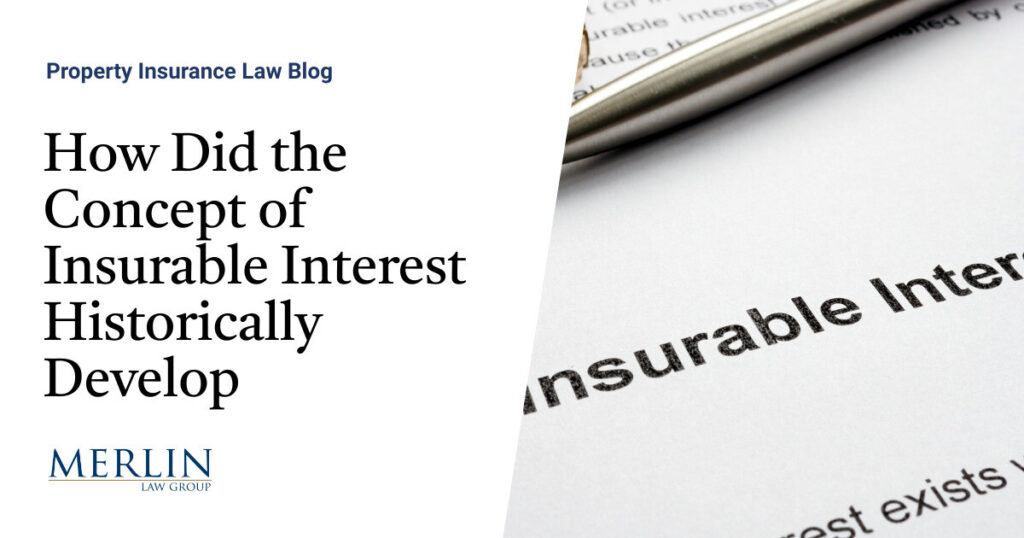How Did the Concept of Insurable Interest Historically Develop?

The insurable interest doctrine is a basic concept of insurance law. An extremely well-written law review article by Blake Berscheid, Gambling with the Future of Property Insurance, discusses the underlying reasons for the doctrine: 1
The United States’ modern property insurance industry descended from seventeenth-century English marine insurance. Lloyd’s of London, now world-renowned for its underwriting activities, started with humble beginnings as a coffee shop in the late 1600s. Lloyd’s built a reputation in London as a hub for sharing shipping and marine intelligence, eventually developing into a marine insurance marketplace. However, more speculative activities followed, with ‘insurance’ available on a wide variety of oddities. In response, legislation was passed with the goal of banning gambling and wagering activities undertaken under the guise of insurance. Lloyd’s maintained a reputation for gambling ventures into the twentieth century, despite laws regulating gambling within insurance existing for over one hundred and fifty years.
…
Wager policies, as they were called, were common in the 1730s and 1740s. The distinction drawn between ‘insurance’ and ‘wager policies’ was that ‘in policies upon interest (‘insurance’), you recover for the loss actually sustained, whether it be total or partial: but upon a wager policy, you can never recover but for a total loss,’ because the risk is all or nothing. Lord Mansfield, an eighteenth century English judge, recognized insurance as ‘a contract of indemnity, and of great benefit to trade.’ However Lord Mansfield also felt use of insurance ‘was perverted by its being turned into a wager.’ Many insurance products departed from traditional societal benefits, and ‘instead of confining the business of insurance to real risks, and considering them merely as an indemnity to the fair dealer against any loss which he might suffer in the course of a trading voyage … the practice of insuring ideal risks [without proof of interest] … was increasing to an alarming degree.’ The policies, ‘having no reference whatever to actual trade or commerce, were very justly considered as mere gaming or wager policies, and therefore the legislature thought it necessary to give them an effectual check.’
Activities within Lloyd’s did not go unnoticed by lawmakers and the ‘effectual check’ came with the Marine Insurance Act of 1745, ‘which sought to put an end to the practice of wagering disguised by marine policies.’ The Act labelled wager policies as a ‘mischievous kind of Gaming or Wagering, under the Pretence of assuring the Risque on Shipping, and fair Trade, the Institution and laudable Design of making Assurances, hath been perverted; and that which was intended for the Encouragement of Trade and Navigation, has … become hurtful of, and destructive to the same ….’ The law prohibited all forms of insurance where assured parties did not have an insurable ‘interest’ in the subject matter. Passage of the Marine Act of 1745 apparently did not entirely dissociate gambling from insurance activities. Clearly, Lloyd’s had earned a reputation within London, with the London Chronicle writing in 1768 that ‘[t]he introduction and amazing progress of illicit gaming at Lloyd’s coffee-house is among others a powerful and very melancholy proof of the degeneracy of the times.’
Lloyd’s recognized its own shortcomings and the perhaps inevitable involvement of the Crown, following passage of the 1745 Marine Insurance Act. Initially, in 1771, a group of Underwriters branched off to form ‘New Lloyd’s’ with the intent of distancing themselves from the disreputed practices of ‘Old’ Lloyd’s. After several years of failing to identify a suitable permanent home, “New Lloyd’s” was formally established in 1774. At the first ‘New Lloyd’s’ meeting in March 1774, the following resolution was passed: ‘Shameful Practices which have been introduced of late years into the business of Underwriting, such as making Speculative Insurances on the Lives of Persons and on Government Securities.’ The resolution went on further to recommend that ‘Insurers in general will refuse subscribing such Policies, and that they will show a proper Resentment against any Policy Broker who shall hereafter tender such Policy to them.’ ‘New Lloyd’s’ was started with a clear stated goal of moving away from its historical ‘illicit gambling’ past.
While the Marine Act of 1745 required policyholders to have an ‘insurable interest,’ the statute did not specify what was considered an insurable ‘interest.’ Clarification was provided in an 1806 English Court decision (Lucena v. Crauford), holding an insurable interest as, ‘a right in the property, or a right derivable out of some contract about the property, which in either case may be lost upon some contingency affecting the possession or enjoyment of the party.’ This holding provided an initial legal definition of insurable interest, which remains a foundation of insurance today.
Marine insurance continued to develop largely through common law decisions, until the Marine Insurance Act of 1906. This act codified substantive principles of marine insurance developed through common law since the 1745 Act. The 1906 Act included an explicit definition of ‘insurable interest,’ incorporating wording from the Marine Act of 1745 and concepts from Lucena v. Craufurd. The Act is still largely in force today.
The lesson from today’s post is that one of the underlying reasons for the requirement of “insurable interest” in a historical context is the belief that an insurance policy should not be a wagering contract. There are other reasons supporting the “insurable interest doctrine,” which will be discussed in a follow-up post.
Thought For The Day
Insurance and gambling both involve uncertainty. You’re not guaranteed a return on your investment, but you’re willing to take the chance for the potential payout.
—David Brown
1 Blake Berscheid, Gambling with the Future of Property Insurance, 58 Tort Trial & Ins. Prac. L.J. 115 (2023).







